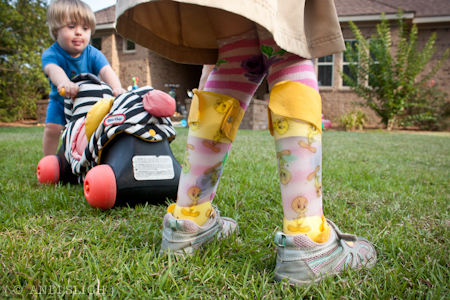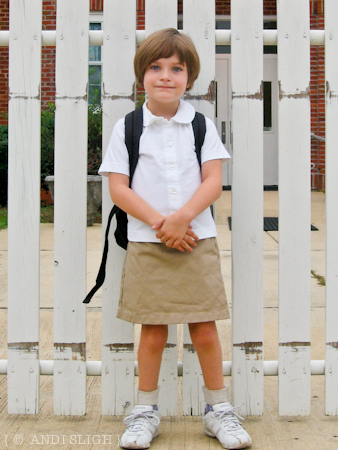
Sarah Kate has had physical therapy on a weekly (at minimum) basis for almost nine years, with one brief hiatus in 2008. Other than basics like eating, sleeping, and bathing, I can’t think of too many things that I’ve done every week for my entire life, can you? It’s just one of those things that children with cerebral palsy face – the constant tweaking, evaluating, and practicing the things that most able-bodied people take for granted.
And, I, for one, am pretty tired of it.
Sarah Kate likes all of the therapists and assistants that she’s worked with over the years, but that doesn’t mean she always enjoys therapy. In the beginning, she was often easily distracted by the fun games that they would play to get her to do things. Today, she still enjoys the games, but she’s under no delusions that the purpose of being there is to have fun. Sometimes she works hard, but other times she stalls and deflects, passive-agressively resisting.
I know she’s tired of it, too.
Recently, when I mentioned how much Sarah Kate’s running improved during the softball season, despite the fact that she did very little running, commenter Sarah reminded me that so much of the progress that is made by patients with cerebral palsy is about changing the brain, not changing the body. She pointed out that her improvements may have had as much to do with watching people running as from the act of doing it.
It occurred to me that she’s probably on to something.
I’m not discounting physical therapy altogether – we’ve had great luck with the intensive program she’s participated in several times, in particular. But there are times that I wonder how much of a difference this one hour per week is actually making. Of course, her therapy isn’t limited to that one hour – she wears knee immobilizers while sleeping to stretch her legs, does her own stretching (sporadically, I’ll admit), swims, plays softball, and is active most days playing in the yard and up and down our street. We remind her constantly to put her heels down, to work on standing still, and all of those things that she does at the therapy office. But there’s a little thought nagging at me.
Some of the most obvious gains she’s made (like the running) occurred hand-in-hand with non-therapy.
We believed right up until the summer she started school that she would need either an aide or an assistive device in kindergarten. Although she’d been walking independently for about two years, she couldn’t stand still. Since she hadn’t used canes in two years (the walker was ditched even earlier), we hoped that she’d miraculously learn to stand still by August, but we were doubtful.
We went to a friend’s house after dinner one night in the late spring and they had bought a Wii for their grandchildren. It was 2008, so they were still new and Sarah Kate had never seen one before. They showed her how it worked and started up the Wii bowling. Mr. Andi and I sat, dumbfounded, as she stood perfectly still and bowled. Three weeks in intensive PT had just ended without progress in standing still, but fifteen minutes of Wii bowling clinched the deal.
We ordered a Wii right away.
Sarah Kate has never had an aide, canes, or a walker at school. She has a loaner wheelchair in her classroom for emergencies and lengthy walking field trips ONLY. And of course you already know about the kneeling and the running achievements since she started softball in February.

I don’t know that the Wii is what made the difference – perhaps the strength she gained in therapy laid the groundwork, and the Wii just pushed her over the edge – but I believe that it was the difference. Was it a physical thing, or a retraining of the mind? Again, I don’t know, but I believe it had a lot to do with the brain.
From time to time, I begin to wonder if therapy is all it’s cracked up to be.
Of course, that’s when I start thinking that maybe we should just ditch the therapy and go about our merry way. Sarah Kate’s always been an active child, and her early intervention therapist was known to say that “she does her own therapy.” I wonder if enrolling her in a few more active extracurriculars with her able-bodied peers might not be better than the once-weekly (again, at a minimum) torture. That’s the point when I start to argue with myself (…She needs therapy…You’ll be short changing her if you don’t take her…She could regress if she doesn’t have a therapist monitoring her regularly…) I-Want-the-Best-For-My-Daughter Mom crashes headlong into I-Just-Want-Her-to-Enjoy-Her-Childhood Mom.
I think it’s time for a compromise. One of us needs a break from therapy.
Disclaimer: I’m not a professional; I’m just a tired mom. I have no empirical evidence and I haven’t done any studies. Don’t base treatment decisions on what I say. There’s a lot I don’t know, but I’ll posit that there’s a lot the pros haven’t discovered yet.

Hm. Lots to think about here. I think you have strong points in favor of ditching therapy. I think there’s a lot to be said in terms of what you talk about with her motivation, and it’s likely that is the thing pushing her over the edge. Softball, the wii, swim – all those are things she wants to do and be successful at, so she pushes herself just a little bit more.
Have you talked to her therapist about it? I know that’s hard because it’s self-serving for the therapist to say she should stay in it, but maybe you’d be surprised that they agree with you and then you’ll feel less mom-guilt over taking a break from it?
Just for the record I can’t stand still for more than a few seconds. I have to REALLY think about it to do it & even then it doesn’t always work. I’ve had PTs that would “allow” me to have Summers off, or cut back, because I was more active in the summer. So it has to be a compromise of sorts with what you need & what your body can actually handle. I’m sure I’ve mentioned this before to someone but I’ll say it here (in case it wasn’t to you). I’ve made more progress working with an exercise physiologist than with a PT. It’s basically the same idea but different approaches. It doesn’t work for everybody but PT doesn’t always work either.
I love my PT because she really checks in with me about what activities both motivate my son and what we physically want to be doing in his life. She also totally knows that while I want to give Aidan the best, he’s part of a family, one that needs a sane mom. I’ve said no to therapy before and I’ve doubled up sometimes in the summer. It’s a complex decision with no right or wrong answer.
Also, have you read The Brain that Changes Itself? It’s amazing and Sarah is right, it’s about the brain more than the body. Highly recommend it.
Good luck with this decision.
Excellent post! You are obviously much further along into the therapy world that I am, but I am a tired mom too. We have up to 7 therapies a week (for Ds and SPD) and I wonder. . . is all of this really helping? This summer, I have opted to drop a few sessions and stick with the few that I have seen great results from (i.e. ABA therapy and music therapy). She is also going to start preschool twice a week and I hope that perhaps, the school setting with other children will help her more than structured therapy.
So perhaps, I am wondering if you took the summer off from PT and instead had SK more involved with the various sports that she wants to be involved in, that she wants to be successful in. At the end of summer, reassess.
Let’s us know what you and SK decide. I always enjoy reading your thoughts and matters that I am certain have crossed several of your readers’ minds.
Hello from Australia! I worked as an OT in the USA for nearly 10 years, and I found that the American system relied heavily on direct one to one therapy intervention. In Australia the model is different: you see a therapist once every two weeks or so, and have ‘homework’ in between. Our daughter with CP gets the benefit from going to the park and playing as much as from her reviews with the physio. And there were times in the US when I would work with a child and in some cases felt that if the mum and dad could take their child to the park more often and play with them the child would get the same benefit. Having said that, therapy helps lay down a picture in the brain of the movement or activity, along with watching an activity performed, and this is where the more subtle interplay occurs. They are called mirror neurones. Why not reduce the therapy for a three month period and see what happens with extra sport etc? You are an excellent mum, you will know if she needs more!
why not cut back to once a month or every other month so you have someone monitoring her but it’s not a tedious weekly appointment? give you a break but at the same time calm your mind that you may be missing something.
It’s so good to know my son (7) isn’t the only child with CP who stalls, deflects and passive-aggressively resists. Sometimes he is so clever at distracting his OT that it astounds us. Including using an American accent for the whole therapy session (we are Australian). Our son has had some great benefit from therapy, but we have had some very negative and I believe detrimental affects as well. Like you, I’m over it, and my son definitely is at times. We are perservering in order to get him to practise his writing, because his therapist is the only who can get him to do it. Good luck with your decision. I love hearing about your experiences, and in particular about Sarah Kate.
I think you’re onto something here…it’s not the therapy that’s bad, it’s the fact that she KNOWS it’s therapy. When it’s softball or Wii, she’s not thinking about it, she’s just playing. It’s totally psychological, but if therapy has become something negative she’s going to resist it. I’ve seen the same thing with exercise…I know a larger little girl who wouldn’t exercise if you paid her. But put her in a play center with jumping castles and slides, and she’ll run until she’s red and sweating.
I think you should definitely get Sarah Kate into more sports and fun stuff that she will gladly participate in and see if that makes a bigger difference over therapy.
Rock on, Andi. I love this post (as I’m sure you knew I would). Buy a copy of Kids Beyond Limits (they’re super cheap and totally worth it) and see how it can take your wondering to near-certainty that PT isn’t all its cracked up to be.
I say near-certainty because like you, I, too, am far from sure that our path is the right one but it feels right and that’s something.
For my daughter and our family, we choose to pull her out of all her therapies for the summer. We continue with stretching and massage done @ home but ultimately she needs to be a kid and have a break too. She enjoys the time off and starts back in the fall fresh and ready to work.